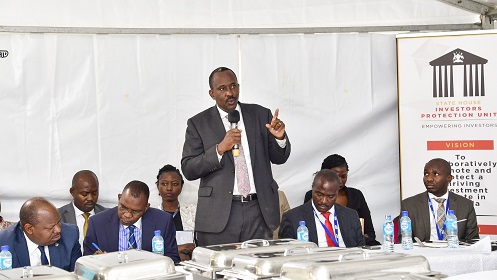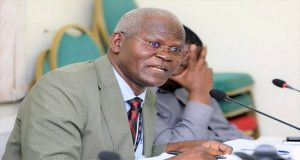
The Uganda Revenue Authority (URA) Commissioner General, Mr. John Rujoki Musinguzi, has said that local investors are the backbone of the economy and has appreciated them for their contribution towards the economy by paying taxes.
Musinguzi made this remark yesterday during a meeting with domestic investors in the various sectors of the economy and policy makers at the unit’s offices in Kampala.
He assured the investors that the authority recognizes the challenges they face when it comes to paying taxes, and they aim to improve their revenue administration by enhancing their relationship with taxpayers.
“Such meetings give me an opportunity to sit down with my team to come up with solutions to your challenges. We are carrying out taxpayer engagements so that we treat you fairly. We are doing it sector by sector. We want you to help us widen the tax base, and these engagements will help us agree on how we can work together better,” Mr. Musinguzi said.
“Taxes, when well handled, will not kill your business, but errors will,” he further advised.
The Head of the State House Investors Protection Unit, Col. Edith Nakalema, has assured local investors that the government is committed to supporting them to develop their businesses since they play a vital role in the transformation of Uganda’s economy.
She said support is being offered through the unit, which was established by President Yoweri Kaguta Museveni this year to collaboratively promote and protect a thriving investment climate in Uganda.
“You are of great importance and honor to His Excellency the President. He heard your appeal that the government should intervene to make what you are doing better,” she said.
Col. Nakalema made the assurance today during a meeting with domestic investors in the various sectors of the economy and policy makers at the unit’s offices in Kampala.
She also appreciated the local investors for their contribution towards the development of Uganda’s economy through creating jobs, paying taxes, and promoting value addition to the country’s raw materials.
“We thank you for promoting patriotism by investing in our country. You would have taken the investment elsewhere, but you decided to invest here. You are great patriots; for that, we appreciate you,” Col. Nakalema asserted.
“We are ready to respond to all your appeals and help you deal with the issues affecting your businesses, such as the challenges of bank loans and taxes. We shall make sure that the environment for investment is a good one. As policy makers, you should sensitize the indigenous investors to see how they can benefit from the different government programs.”
Col. Nakalema, however, expressed concern over the inability of local investors to access loans under the Agricultural Credit Facility and Small Business Recovery Fund due to unfavorable processes.
“The Agricultural Credit Facility has not been accessed well by the beneficiaries. Farmers are complaining,” she revealed.
“There’s a need to consider Small And Medium-Sized Enterprises to have special financing otherwise we are losing them yet we need them for our economic development.”
Col. Nakalema further reminded the local investors of the obligations they must fulfill as businesspeople.
“When you borrow, you must pay back, but without suffering or being under pressure. H.E., the President, insists that no Ugandan must suffer at the hands of others; we mean good, and we want to develop our economy with you. You also have an obligation to pay taxes; pay them happily,” she stated.
“My commitment is that I will try my level best to ensure that all the issues reported to us are attended to and that our economy runs well.”
The Chairperson of Kampala City Traders Association (KACITA), Mr. Thadeus Musoke Nagenda, said the association is ready to work with the State House Investors Protection Unit to empower local business people in the country.
Nagenda, however, expressed concern that many local investors are closing businesses due to the unfavorable cost of accessing loans.
“The cost of access to loans is still a very big challenge. Personally, I have been processing a loan for the last 9 months, and I have spent over Shs15 million in the process, which means that even to access loans, you have to have money. The bureaucracy, the interest rates, and the cost of doing business are affecting us,” he said.
On the issue of the Small Business Recovery Fund, Mr. Nagenda disclosed that over 500 members of KACITA applied for the loan, but none of them have ever accessed the funds due to unfavorable requirements.
“We also still have issues with the Uganda Development Bank because we have failed to access their loans.”
Mr. John Walugembe, the Executive Director of the Federation of Small and Medium-Sized Enterprises, said the government should focus on financing the small-scale manufacturing sector in order to create sufficient businesses that are able to sustain the economy.
“Financing is the lifeline of all economies. The government should empower domestic investors to develop our economy. I’m happy that the government has put up a number of schemes like the Emyooga and Parish Development Model, but the money is being given to the wrong agents who are supposed to deliver it to Ugandans.”
The Uganda Women Entrepreneurs Association Limited (UWEAL) Chairperson, Ms. Sarah Kitakule, underscored the need for a special affirmative action for women in business to ease access to loans.
“Most times, women cannot actually qualify for loans such as the recovery fund because most of them are in low-productivity economic activities, so they lack the modernized collateral that is required to access the money. We should think of innovative ways of supporting women in business,” she said.
The Director of Economic Affairs at the Ministry of Finance, Planning, and Economic Development, Mr. Moses Kaggwa, requested that the local investors participate actively in business associations, explaining that when they are under these associations, it makes it easy for the government to work with them for a common goal.
On the other hand, Mr. Kaggwa noted that, as the Ministry, they are also concerned over the Small Business Recovery Fund underperformance.
“The government injected Shs200bn into the fund in 2021 when it was established, but only Shs8bn has been given out to beneficiaries. There must be a problem,” he said.
“My top management has tasked me with looking at all the funds that the government has, such as the Emyooga and PDM, among others. We are going to present and assess their success, and then we see a way forward.”
The Bank of Uganda Executive Director of Finance, Mr. Richard Byarugaba, apologized to the local investors involved in agriculture over the frustration they face while trying to access the Agricultural Credit Facility loans but assured them that they are working to ensure that the loans are accessible to them.
“Our agents (banks) are frustrating, we know, but we are dealing with them, and we are going to find out why they are not giving out this money,” Mr. Byarugaba said.
“About the Recovery Fund, the money is there, but business people have failed to pick it up, the reason being that most of the businesses are informal and don’t have requirements like bank accounts.”
The meeting was also attended by officials from the Uganda National Chambers of Commerce, the Uganda Registration Services Bureau (URSB), the Uganda Grain Council, the Uganda Millers Association, the Uganda Tailors Association, and the Uganda Fish Processors and Exporters Association, among others.






